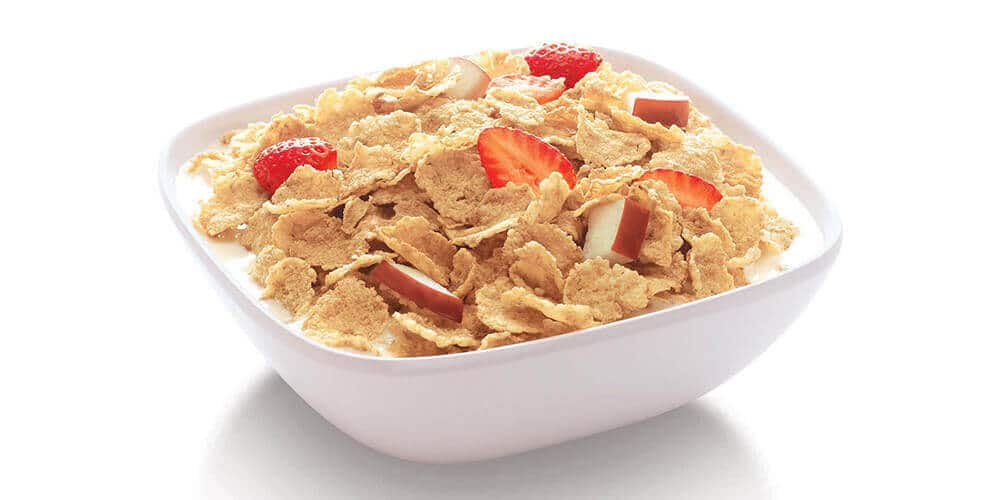
Cereal and Milk – a Unique Contribution to the Daily Diet
In addition to being a convenient, nutritious and tasty start to each morning, cereal provides an excellent way for families to enjoy dairy products and all of its benefits.
Breakfast literally means “Breaking the Fast”. For some people, especially younger children, the overnight fast can last as long as 16 hours. The body needs breakfast since, first thing in the morning, it is low on energy reserves and needs fuel, in the form of food, to get going. More importantly, the body needs the right amount and kind of fuel to help provide it with the correct balance of nutrients to ensure both physical and mental wellbeing.
Recommendations for a balanced breakfast generally include a cereal food (e.g., breakfast cereals), milk or yoghurt, and a serving of fruit or vegetables (typically fresh fruit or unsweetened juice).
Having a balanced breakfast means:
A higher intake of essential nutrients
Research shows that essential nutrients missed at breakfast are not compensated for during the other meals of the day.1,2,3 Recent research from a Europe-wide study showed that among children who ate breakfast regularly, breakfast cereals were the most nutritious choice compared to other breakfast alternatives.4
Increased control over appetite
Breakfast helps to control appetite. People who eat breakfast regularly are less likely to be hungry and snack on energy-dense foods during the rest of the day.5
Increased likelihood of having a lower Body Mass Index (BMI)
Breakfast consumption is associated with a lower incidence of people being overweight and obese – important in a region where overweight and obesity are widespread among all age groups6. Data from across the globe shows that children and adults who eat a balanced breakfast have healthier body weights compared to those who skip breakfast,5,7,8,9 and breakfast cereal consumers tend to be slimmer and have a lower BMI than those who don’t have cereal for breakfast.7,10
Enhanced cognitive abilities
A balanced breakfast boosts mental and physical performance in both adults and children. Teachers commonly observe that a healthy breakfast is essential for children to learn effectively, and research supports this observation.11 Those who have eaten a balanced breakfast have been proven to: more efficiently select critical information during problem-solving tasks;12 perform better in both mathematical and creative tasks;13 and demonstrate improved accuracy on a range of cognitive function tests.14
Adults also benefit mentally from eating a balanced breakfast. In a series of memory and recall tests, those who had eaten a balanced breakfast performed significantly better at information retention tasks compared to those who had not eaten breakfast. Recollection speed also improved.15,16
A reduction of cardio metabolic risk
Over the last few decades, dietary habits have changed considerably in the Arab Gulf and the incidence of chronic non-communicable diseases such as coronary heart disease, hypertension, diabetes and cancer have risen dramatically to become the leading health problems6. Eating breakfast, is associated with a reduction in risk of developing diabetes, heart disease or suffering a stroke.17
Breakfast - Make Every Day a Better Day
More than just a meal, breakfast is the springboard to the day’s possibilities. By enjoying a balanced breakfast each day, we all get the energy we need to make the most of every morning. We kick-start our metabolism and we’re all set up for a successful day.
Breakfast cereals can be a great-tasting, timesaving, nutritionally balanced option compared to a more traditional style breakfast.
A bowl of Kellogg’s breakfast cereal provides at least 25% of the recommended intake of 6 B-group vitamins (thiamin (B1), riboflavin (B2), niacin (B3), Vitamin B6, Vitamin B12, folic acid), Vitamin D (in kids and family cereals) and at least 15% of the recommended intake for iron
Preparing and eating a bowl of cereal takes less than 5 minutes in the morning and will provide all the family with great nutritional benefits. Choosing breakfast cereals makes a great start to every day for all the family.
References
Helping consumers make informed food choices

In addition to being a convenient, nutritious and tasty start to each morning, cereal provides an excellent way for families to enjoy dairy products and all of its benefits.

Despite its many assets, breakfast cereal is sometimes misunderstood. Explore this section to debunk some common myths!

There is consistent evidence that children and adults who regularly eat breakfast are less likely to be overweight than breakfast skippers, explore this section to find out more!
Mars Completes Acquisition of Kellanova. Read More